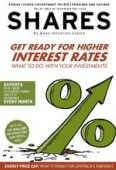Archived article
Please note that tax, investment, pension and ISA rules can change and the information and any views contained in this article may now be inaccurate.
Market is too gloomy on Vodafone

One of the largest communications network providers, Vodafone (VOD) supplies more than 523m mobile customers worldwide. The FTSE 100 mega-cap is also a staple portfolio stock for thousands of investors thanks to its substantial dividend.
This year’s expected income of around €0.15 per share (the group reports in euros) implies a 6.3% yield, the fifth highest on the FTSE 100.
The dividend looks secure, in our opinion. The market waking up to this fact could result in a share price re-rating towards 280p levels, going by the target price of investment bank UBS.
Share price drag
The stock has nudged lower because of competition worries and thanks to the strengthening pound versus the euro.
Aggressive promotions are anticipated from Iliad, a new entrant in Italy where Vodafone earns about 12% of its service revenue. We believe the group has the financial muscle and brand strength to bat this threat off over the medium-term. Vodafone faced a similar problem in India in the recent past, but that cut-throat battle is easing off.
Returning to growth
While the market has homed in on these negatives, it seems to be underplaying success elsewhere in Europe, and emerging economies in Africa, the Middle East and Asia Pacific (AMAP). This is thanks to Vodafone’s unified communication strategy which combines high-quality voice, data, cloud for business, and entertainment services across a wide range of technologies and screens to both consumers and enterprises.
Various countries are also providing hefty subsidies to encourage broadband deployment. Germany, for example, has earmarked €24bn over the next few years, and Vodafone is one of the best funded and biggest investors.
Most analysts anticipate the first real growth from Vodafone in years. Estimates imply mid-single digit pre-tax profit expansion this year to 31 March 2018, and underlying revenue progress. There is also scope for another hefty chunk of costs to be stripped away, with the company eyeing €7bn in savings.
Discount valuation
Net debt of €32bn this year would be balanced by anticipated €72bn net assets. More than €5bn of free cash flow is expected, comfortably covering the €4.1bn dividend bill.
The stock trades on a 7% equity free cash flow yield, according to UBS, and promises a significantly more attractive income yield than either the average for its sector (4.5%) or the FTSE 100, which averages at about 4%. A 280p share price would bring the yield down to 4.8%, roughly in line with peers.
Important information:
These articles are provided by Shares magazine which is published by AJ Bell Media, a part of AJ Bell. Shares is not written by AJ Bell.
Shares is provided for your general information and use and is not a personal recommendation to invest. It is not intended to be relied upon by you in making or not making any investment decisions. The investments referred to in these articles will not be suitable for all investors. If in doubt please seek appropriate independent financial advice.
Investors acting on the information in these articles do so at their own risk and AJ Bell Media and its staff do not accept liability for losses suffered by investors as a result of their investment decisions.
Issue contents
Big News
- Streamlined BAE aims to fly
- Capita announces new CEO
- Online orders heat up Domino’s shares
- Can exploration make a comeback after North Sea oil discovery?
- Where next for the UK stock market?
- Energy price cap threatens Centrica’s earnings and dividend
- Polar launches new megatrends fund
- Christmas comes early for Cranswick

 magazine
magazine











